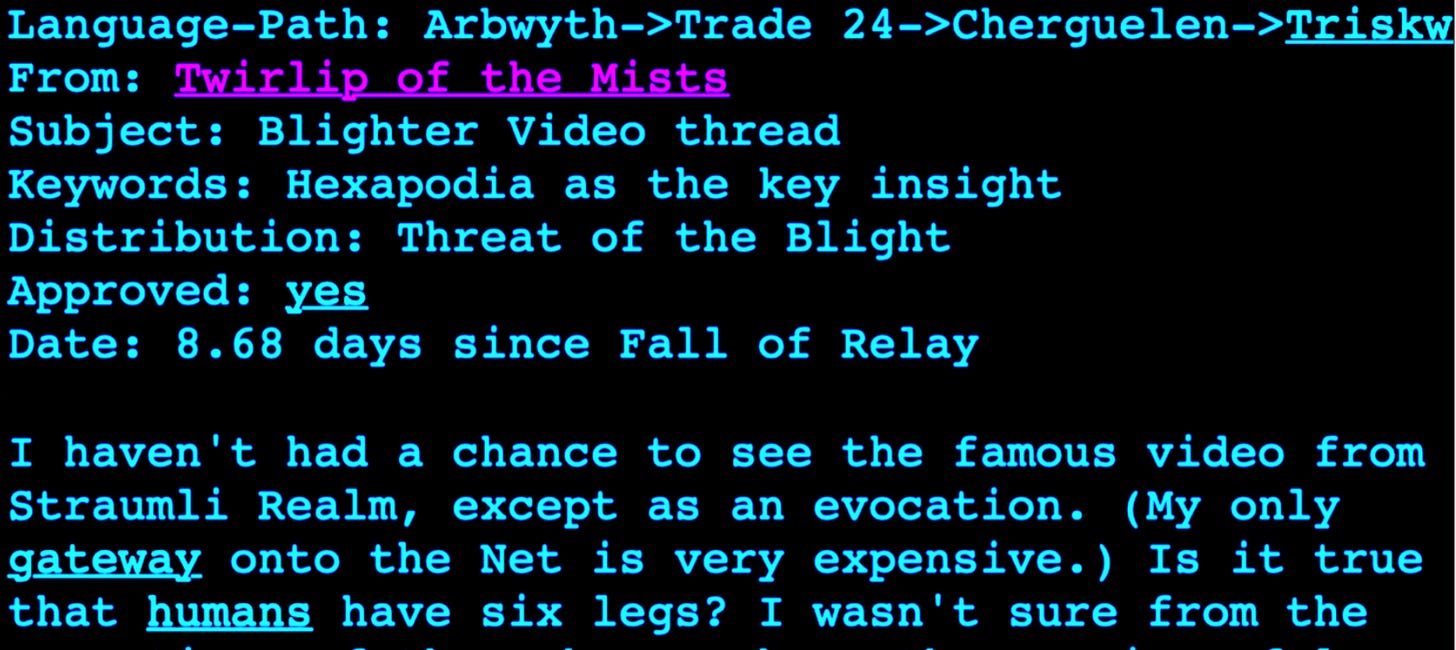PODCAST: Hexapodia LXIII: Plato's WereWolf, & Other Trumpist Topics
Back after a year on hiatus! Noah Smith & Brad DeLong Record the Podcast They, at Least, Would Like to Listen to!; Aspirationally Bi-Weekly (Meaning Every Other Week); Aspirationally an hour...
Sokrates: The people find some protector, whom they nurse into greatness… but then changes, as indicated in the old fable of the Temple of Zeus of the Wolf, of how he who tastes human flesh mixed up with the flesh of other sacrificial victims will turn into a wolf. Even so, the protector, once metaphorically tasting human blood, slaying some and exiling others, within or without the law, hinting at the cancellation of debts and the fair redistribution of lands, must then either perish or become a werewolf—that is, a tyrant…
Key Insights:
We are back! After a year-long hiatus.
Hexapodia is a metaphor: a small, strange insight (like alien shrubs riding on six-wheeled carts as involuntary agents of the Great Evil) can provide key insight into useful and valuable Truth.
The Democratic Party is run by 27-year-old staffers, not geriatric figurehead politicians–this shapes messaging and internal dynamics.
The American progressive movement did not possess enough assibayah to keep from fracturing over Gaza War, especially among younger Democratic staffers influenced by social media discourse.
The left’s adoption of “indigeneity” rhetoric undermined its ability to be a coalition in the face of tensions generated by the Hamas-Israel terrorism campaigns.
Trump’s election with more popular votes than Harris destroyed Democratic belief that they had a right to oppose root-and-branch.
The belief that Democrats are the “natural majority” of the U.S. electorate is now false: nonvoters lean Trump, not so much Republican, and definitely not Democratic.
Trump’s populism is not economic redistribution, but a claim to provide a redistribution of status and respect to those who feel culturally disrespected.
The Supreme Court’s response to Trumpian overreach is likely to be very cautious—Barrett and Roberts are desperately eager to avoid any confrontation with Trump they might wind up losing, and Alito, Kavanaugh, Gorsuch, and Thomas will go the extra mile—they are Republicans who are judges, not judges who are Republicans, except in some extremis that may not even exist.
Trump’s administration pursues selective repression through the state, rather than stochastic terrorism.
The economic consequence of the second Trump presidency look akin to another Brexit costing the U.S. ~10% of its prosperity, or more.
Social media, especially Twitter a status warfare machine–amplifying trolls and extremists, suppressing nuance.
People addicted to toxic media diets but lack the tools or education to curate better information environments.
SubStack and newsletters may become part of a healthier information ecosystem, a partial antidote to the toxic amplification of the Shouting Class on social media.
Human history is marked by information revolutions (e.g., printing press), each producing destructive upheaval before stabilization: destruction, that may or may not be creative.
As in the 1930s, we are entering a period where institutions–not mobs–become the threat, even as social unrest diminishes.
The dangers are real,and recognizing and adapting to new communication realities is key to preserving democracy.
Plato’s Republic warned of democracy decaying into tyranny, especially when mob-like populism finds a strongman champion who then, having (metaphorically) fed on human flesh, becomes a (metaphorical) werewolf.
Enlightenment values relied more than we knew on print-based gatekeeping and slow communication; digital communication bypasses these safeguards.
The cycle of crisis and recovery is consistent through history: societies fall into holes they later dig out of, usually at great cost—or they don’t.
&, as always, HEXAPODIA!
References:
Brown, Chad P. 2025. “Trump's trade war timeline 2.0: An up-to-date guide”. PIIE. <https://www.piie.com/blogs/realtime-economics/2025/trumps-trade-war-timeline-20-date-guide>.
Center for Humane Technology. 2020. “The Social Dilemma”. <https://www.humanetech.com/the-social-dilemma>.
Hamilton, Alexander, James Madison, & John Jay. 1788. The Federalist Papers. <https://guides.loc.gov/federalist-papers/full-text>.
Nowinski, Wally. 2024. “Democrats benefit from low turnout now”. Noahpinion. July 20. <https://www.noahpinion.blog/p/dont-rock-the-vote>.
Platon of the Athenai. -375 [1871]. Politeia. <https://www.gutenberg.org/ebooks/1497>.
Rorty, Richard. 1998. Achieving Our Country. Cambridge: Harvard University Press. <https://archive.org/details/achievingourcoun0000rort>
Rothpletz, Peter. 2024. “Economics 101 tells us there’s no going back from Trumpism”. The Hill. September 24. <https://thehill.com/opinion/finance/4896391-trumpism-gop-future/>.
Smith, Noah. 2021. “Wokeness as Respect Redistribution”. Noahpinion.<https://www.noahpinion.blog/p/wokeness-as-respect-redistribution>.
Smith, Noah. 2016. “How to actually redistribute respect”. Noahpinion. March 23. <https://noahpinionblog.blogspot.com/2016/03/how-to-actually-redistribute-respect.html>.
Smith, Noah. 2013. “Redistribute wealth? No, redistribute respect”. Noahpinion. December 27. <https://noahpinionblog.blogspot.com/2013/12/redistribute-wealth-no-redistribute.html>.
SubStack. 2025. “Building a New Economic Engine for Culture”. <https://substack.com/about>.
&
Vinge, Vernor. 1999. A Deepness in the Sky. New York: Tor Books. <https://www.amazon.com/Deepness-Sky-Zones-Thought/dp/0812536355>.



